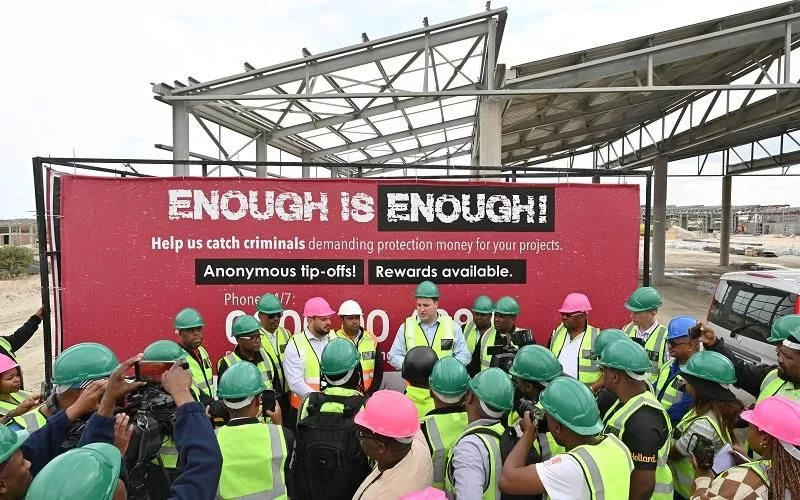This article covers the tragic death of Oreratile Chabalala at Odi District Hospital and aims to provide accurate information to dispel any misconceptions. Oreratile was brought to the hospital with breathing problems and chest pains, and despite the healthcare team’s efforts, the child’s condition worsened. During the transfer process to another hospital, Oreratile experienced a cardiac arrest and could not be saved. The Gauteng Department of Health clarifies misconceptions and emphasizes the importance of transparency in maintaining public trust in the healthcare system.
What happened to Oreratile Chabalala at Odi District Hospital?
Oreratile Chabalala was brought to Odi District Hospital and later transferred to Dr. George Mukhari Academic Hospital due to breathing problems and chest pains. During the handover process between hospital staff and Gauteng Emergency Medical Services paramedics, Oreratile’s condition deteriorated further, and the child experienced a cardiac arrest. Despite attempts to resuscitate the child, they, unfortunately, could not be saved. The Gauteng Department of Health offers its sincere condolences to the Chabalala family for their heartbreaking loss.
The Unfortunate Demise of Oreratile Chabalala
In the world of healthcare, a sector dedicated to preserving life and promoting well-being, there are unfortunate moments when a patient’s life is lost. In such cases, it is vital to address public concerns and dispel any misinformation. A recent incident at Odi District Hospital in Mabopane, Tshwane, resulted in the tragic death of six-year-old Oreratile Chabalala. This article aims to shed light on the details of the case and provide accurate information to correct any misconceptions.
Oreratile Chabalala was brought to Odi District Hospital on October 2, 2023, exhibiting breathing problems and chest pains. The healthcare professionals at the hospital did everything they could to stabilize the child’s condition. Regrettably, on October 6, the patient’s condition worsened, necessitating a higher level of care.
The Transfer Process and Ambulance Availability
Since Odi District Hospital lacks an Intensive Care Unit (ICU) due to its classification as a district hospital, the medical team decided to move Oreratile to a facility with the necessary resources. Dr. George Mukhari Academic Hospital (DGMAH) confirmed a pediatric ICU bed’s availability on October 7. The transfer process was promptly initiated, with an ambulance request recorded at 15:18.
Considering the patient’s critical condition, an ICU ambulance outfitted with high care equipment was required for the transfer. The closest available ICU ambulance, stationed at Mamelodi Hospital and attending to another critical patient, was immediately rerouted to Odi at 16:48. The ambulance reached Odi District Hospital around 17:15, as verified by CCTV footage and the Gauteng Emergency Communication Centre records.
During the handover process between hospital staff and Gauteng Emergency Medical Services (EMS) paramedics, Oreratile’s condition deteriorated further, and the child experienced a cardiac arrest. Despite attempts to resuscitate the child, they, unfortunately, could not be saved. The Gauteng Department of Health (GDoH) offers its sincere condolences to the Chabalala family for their heartbreaking loss.
Clarifying Misconceptions and Future Improvements
Erroneous information disseminated in the media has created misunderstandings about the availability of an ambulance for the patient’s transfer. The GDoH stresses that an ambulance was always on standby to transport Oreratile to DGMAH, contrary to these claims. Odi EMS operates with five intermediate ambulances daily, sufficient to handle the average of 21 emergency calls per shift.
The GDoH is dedicated to collaborating with various stakeholders to enhance its service platforms and foster consensus. In response to concerns about general EMS response times, the GDoH has outlined multiple interventions aimed at improving response times, as detailed in a statement released on August 8.
Concluding Thoughts on the Importance of Transparency
In summary, transparency and accurate information are crucial in maintaining public trust and confidence in the healthcare system. It is essential to recognize the tireless efforts of healthcare professionals in saving lives and providing the highest quality care for their patients. Although the loss of a patient is always a heart-wrenching experience, it is vital to acknowledge the dedication of the healthcare workers involved in this case. May Oreratile Chabalala rest in peace, and may the Chabalala family find comfort in the truth during this challenging time.
1. Who was Oreratile Chabalala?
Oreratile Chabalala was a six-year-old child who was brought to Odi District Hospital on October 2, 2023, exhibiting breathing problems and chest pains.
2. What was the cause of Oreratile’s death?
During the transfer process from Odi District Hospital to Dr. George Mukhari Academic Hospital, Oreratile experienced a cardiac arrest and could not be saved.
3. Why was Oreratile being transferred to another hospital?
Oreratile was being transferred to another hospital because Odi District Hospital lacks an Intensive Care Unit (ICU) due to its classification as a district hospital.
4. Was an ambulance available for Oreratile’s transfer?
Yes, an ambulance was always on standby to transport Oreratile to Dr. George Mukhari Academic Hospital.
5. What is the Gauteng Department of Health’s response to concerns about EMS response times?
The Gauteng Department of Health has outlined multiple interventions aimed at improving EMS response times.
6. How many intermediate ambulances does Odi EMS operate with daily?
Odi EMS operates with five intermediate ambulances daily, sufficient to handle the average of 21 emergency calls per shift.
7. What was the role of Gauteng Emergency Medical Services (EMS) in Oreratile’s case?
Gauteng EMS paramedics were involved in the transfer process of Oreratile from Odi District Hospital to Dr. George Mukhari Academic Hospital.
8. What is the importance of transparency in the healthcare system?
Transparency and accurate information are crucial in maintaining public trust and confidence in the healthcare system. It is essential to recognize the tireless efforts of healthcare professionals in saving lives and providing the highest quality care for their patients.








